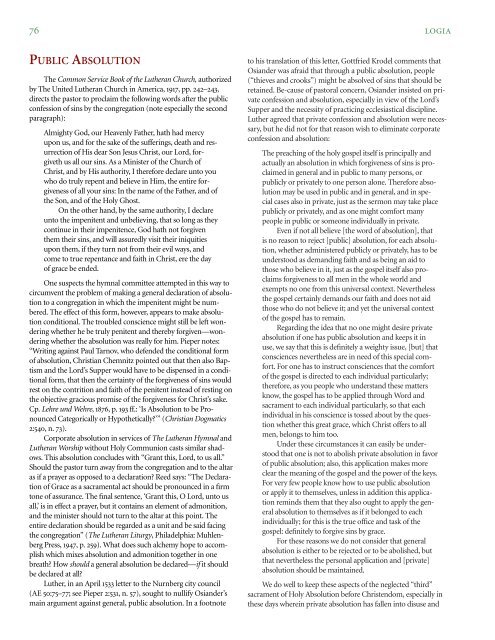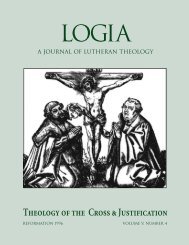LOGIA FORUM 75sight of God, for all have fallen short in sinfulness [sic] and allreceive the promises of forgiveness” (p 42). Based on this statement,it is asserted: “We cannot believe—because God has notsaid! that our Maker views daughters differently than sons” (p. 42).The doctrine of baptism is called upon to bolster the argument.“How are we to respond to our baptism and to the commissionto go and teach?” asks the essayist (p. 42). She chafes atMissouri’s “traditional answer . . . that, depending on our physicalshape, the church must ascertain which channels are theappropriate ones” (p 42). Mrs. Nuechterlein maintains that“there is nothing in the baptismal covenant suggesting such aproviso: at the font we don’t separate infants into boy and girlcategories” (p. 42).This way of speaking is echoed in the opening paragraph ofthe CTCR’s latest opinion, “The Service of Women in Congregationaland Synodical Offices” (Reporter, December 1994, vol. 20 no.12, p. 8). Therein we find it stated that “No one is baptized to beeither man or woman.” What can be the point here? Humanscome in two distinct genders, male and female. Both are baptizedand by God’s grace grow into Christian men and women respectively.Baptism does not neuter God’s good creation. Baptism doeswash fallen humans clean from sin. Surely our sexuality isredeemed, not obliterated. In its disregard toward the sexualhuman bodies that are God’s own handiwork, the language of Mrs.Nuechterlein and the CTCR smacks of Gnosticism. If Missourianswant their synod to turn into a cult served by priestesses, allowingthis kind of language is a good first step.Yet a little later in her Forum article comes the complaint that“many clergymen get little training for shepherding the ewes of theflock, assuming, apparently, that what’s good for the rams is goodenough for all. It is not” (p 42).First, females ought not to be distinguished from males in thechurch. Then, females require special pastoral care, in sharp distinctionfrom care appropriate for males. The illogic is evident. Ifewes must be treated differently than rams, then Mrs. Nuechterlein’sargument from baptism does not hold water.The Catechism is useful in addressing another concern fromMrs. Neuchterlein’s “Perspective.” The complaint is made that“Christendom continues to be experienced as primarily a man’srealm” (p. 42). It is considered a problem that “this church is . . . amale-dominated body” (p. 42), but: Jesus Christus Dominus est.The Lord rules his church. For Christians who take the SecondArticle of the Creed to heart, this is not a problem. This is a sourceof joy. The rule of the Church by Jesus Christ, true God and trueman, is also a source of hope. Members of the Church Militantlong for the Bridegroom’s complete domination of his Bride whenhe comes again at the Last Day (Eph 5:25–27, Rev 21:2–4).Mrs. Nuechterlein’s “Perspective on Women in Missouri” callsfor study and discussion of the issue of women’s service in thechurch. For years, other women who share her views have beencalling for the same thing. Their statements have received a gooddeal of response from Missouri’s clergy and laity. Yet these womendo not seem to have heeded any respondents who differ withthem. One is left to wonder what their continued call for discussionmeans.Kathryn A. HillMonroe, WisconsinPENANCE FOR RETURNING WARRIORS“Not a few modern philosophers and theologians are of the view that,contrary to implications of Nietzsche’s aesthetic rebellion, even fullyautonomous individuals have reasons of the mind and heart to experiencemoral pain occasionally of their behavior in time of war,” saysBernard J. Verkamp in The Moral Treatment of Returning Warriorsin Early Medieval and Modern Times (Scranton: University ofScranton Press, 1993). The portion cited below comes from pages 11–12of his introduction to this stimulating documentary and discussion.The Western world, as Philip Rieff has noted, has largelybecome a “therapeutic” society. In the name of “authenticity” and“individualistic creativity,” many restrictions of old have been discarded.What were once described as wrongdoings and shortcomingsare now often extolled as indicative of a liberated ego or dismissedas sickness and social maladjustment. Moral pain or feelingsof guilt and shame, which were once considered the natural,interior complements of virtuous behavior, are either ridiculed, orreduced to “psychic difficulties.”In sharp contrast to such a therapeutically oriented society isone in which there prevails a moral sensibility based upon acceptanceand interiorization of a set of principles and ideals derivedfrom a uniquely religious teleology. Nowhere, probably, has thisbeen more apparent than in the way soldiers returning from warhave been treated by contemporary American and early medievalChristian society, respectively.The moral needs of soldiers returning from Vietnam, forexample, were often overlooked by American society. Unable,apparently, to face up to its own failure to win the war, or to admitits own complicity in a war that may have been unwise or unjustand an occasion for unprecedented atrocities, the country as awhole simply chose not to take seriously the moral pain felt bymany of the Vietnam veterans.In contrast, the Christian community of the first millenniumgenerally assumed that warriors returning from battle would orshould be feeling guilty and ashamed for all the wartime killingthey had done. Far from having such feelings dismissed as insignificantor irrelevant, returning warriors were encouraged to seek resolutionof them through rituals of purification, expiation, and reconciliation.To accommodate these latter needs, religious authoritiesof the period not infrequently imposed various and sundrypenances on returning warriors, depending on the kind of warthey had been engaged in, the number of their killings, and theintention with which they had been carried out.The existence of such an early medieval penitential practiceregarding returning warriors has long been recognized by historians.No claim of originality is being made, therefore, for the documentationof its development in the first chapter of this book. Pastreferences to the practice, however, have generally been rather cursoryand piecemeal, and it is to be hoped that the chronologicaland more detailed presentation here will better illustrate the natureand extent of the practice. [Note: subsequent chapters deal withthe underlying rationale of such practices, their demise, and possibleapplications to our modern era. At one point, Verkamp cites aLutheran Vietnam veteran who speaks of the healing he found inthe Lutheran liturgy!—ed.]
76 LOGIAPUBLIC ABSOLUTIONThe Common Service Book of the Lutheran Church, authorizedby The United Lutheran Church in America, 1917, pp. 242–243,directs the pastor to proclaim the following words after the publicconfession of sins by the congregation (note especially the secondparagraph):Almighty God, our Heavenly Father, hath had mercyupon us, and for the sake of the sufferings, death and resurrectionof His dear Son Jesus Christ, our Lord, forgivethus all our sins. As a Minister of the Church ofChrist, and by His authority, I therefore declare unto youwho do truly repent and believe in Him, the entire forgivenessof all your sins: In the name of the Father, and ofthe Son, and of the Holy Ghost.On the other hand, by the same authority, I declareunto the impenitent and unbelieving, that so long as theycontinue in their impenitence, God hath not forgiventhem their sins, and will assuredly visit their iniquitiesupon them, if they turn not from their evil ways, andcome to true repentance and faith in Christ, ere the dayof grace be ended.One suspects the hymnal committee attempted in this way tocircumvent the problem of making a general declaration of absolutionto a congregation in which the impenitent might be numbered.The effect of this form, however, appears to make absolutionconditional. The troubled conscience might still be left wonderingwhether he be truly penitent and thereby forgiven—wonderingwhether the absolution was really for him. Pieper notes:“Writing against Paul Tarnov, who defended the conditional formof absolution, Christian Chemnitz pointed out that then also Baptismand the Lord’s Supper would have to be dispensed in a conditionalform, that then the certainty of the forgiveness of sins wouldrest on the contrition and faith of the penitent instead of resting onthe objective gracious promise of the forgiveness for Christ’s sake.Cp. Lehre und Wehre, 1876, p. 193 ff.: ‘Is Absolution to be PronouncedCategorically or Hypothetically?’” (Christian Dogmatics2:540, n. 73).Corporate absolution in services of The Lutheran Hymnal andLutheran Worship without Holy Communion casts similar shadows.This absolution concludes with “Grant this, Lord, to us all.”Should the pastor turn away from the congregation and to the altaras if a prayer as opposed to a declaration? Reed says: “The Declarationof Grace as a sacramental act should be pronounced in a firmtone of assurance. The final sentence, ‘Grant this, O Lord, unto usall,’ is in effect a prayer, but it contains an element of admonition,and the minister should not turn to the altar at this point. Theentire declaration should be regarded as a unit and be said facingthe congregation” (The Lutheran Liturgy, Philadelphia: MuhlenbergPress, 1947, p. 259). What does such alchemy hope to accomplishwhich mixes absolution and admonition together in onebreath? How should a general absolution be declared—if it shouldbe declared at all?Luther, in an April 1533 letter to the Nurnberg city council(AE 50:75–77; see Pieper 2:531, n. 57), sought to nullify Osiander’smain argument against general, public absolution. In a footnoteto his translation of this letter, Gottfried Krodel comments thatOsiander was afraid that through a public absolution, people(“thieves and crooks”) might be absolved of sins that should beretained. Be-cause of pastoral concern, Osiander insisted on privateconfession and absolution, especially in view of the Lord’sSupper and the necessity of practicing ecclesiastical discipline.Luther agreed that private confession and absolution were necessary,but he did not for that reason wish to eliminate corporateconfession and absolution:The preaching of the holy gospel itself is principally andactually an absolution in which forgiveness of sins is proclaimedin general and in public to many persons, orpublicly or privately to one person alone. Therefore absolutionmay be used in public and in general, and in specialcases also in private, just as the sermon may take placepublicly or privately, and as one might comfort manypeople in public or someone individually in private.Even if not all believe [the word of absolution], thatis no reason to reject [public] absolution, for each absolution,whether administered publicly or privately, has to beunderstood as demanding faith and as being an aid tothose who believe in it, just as the gospel itself also proclaimsforgiveness to all men in the whole world andexempts no one from this universal context. Neverthelessthe gospel certainly demands our faith and does not aidthose who do not believe it; and yet the universal contextof the gospel has to remain.Regarding the idea that no one might desire privateabsolution if one has public absolution and keeps it inuse, we say that this is definitely a weighty issue, [but] thatconsciences nevertheless are in need of this special comfort.For one has to instruct consciences that the comfortof the gospel is directed to each individual particularly;therefore, as you people who understand these mattersknow, the gospel has to be applied through Word andsacrament to each individual particularly, so that eachindividual in his conscience is tossed about by the questionwhether this great grace, which Christ offers to allmen, belongs to him too.Under these circumstances it can easily be understoodthat one is not to abolish private absolution in favorof public absolution; also, this application makes moreclear the meaning of the gospel and the power of the keys.For very few people know how to use public absolutionor apply it to themselves, unless in addition this applicationreminds them that they also ought to apply the generalabsolution to themselves as if it belonged to eachindividually; for this is the true office and task of thegospel: definitely to forgive sins by grace.For these reasons we do not consider that generalabsolution is either to be rejected or to be abolished, butthat nevertheless the personal application and [private]absolution should be maintained.We do well to keep these aspects of the neglected “third”sacrament of Holy Absolution before Christendom, especially inthese days wherein private absolution has fallen into disuse and
















